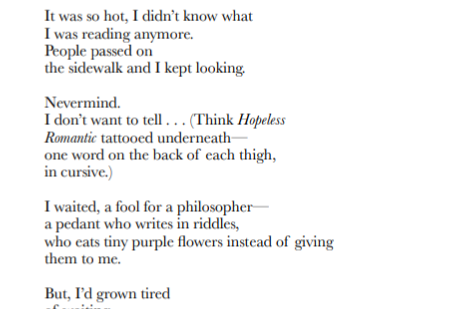Articles/Essays – Volume 48, No. 4
Resolve
One bird often whistled the notes, not the words, of the beginning of Swanee River—“Way down upon the Swa . . .”—without ever feeling inclined to add “. . . nee River,” even after hearing the whole phrase practiced hundreds of times on the piano.
—“Why You Can’t Teach a Starling to Sing,” David Rothenberg
“The music keeps going and never stops,”
I tell my son—“Until the bar line?”
Of course, until the bar line.
He moves his fingers into place with effort,
As if moving in the third person;
As if they are thin sausages on sticks.
I tell him the story about Mozart slipping
Out of bed, darting downstairs, unable
To let a truncated cadence dangle
And suffocate, incomplete, in the air. “How
do you know when it is finished?” he asks,
and I play the changes, those deliberate roads.
In the mornings, above my bed, the insistent wrong
Of his notes buzzes like a trapped fly.
Slower! I croak, or And again! The generations
Coalesce into singularity: a chorus of mothers
And correction, layered like paired mirrors
Around this moment, this music, these words.
The years slip off in sheets, whispering.
In the practice room, I would close my eyes
To better place the music, and awaken later,
Having descended through a jangling
Sleep, head on the fallboard, breathing
In and out the slices of surrounding song.
“It’s more than theory,” my teacher said.
“It’s doctrine. Listen—” and he played us through
Fields and rivers, one light shining starlike
Down the long path, and at last the open door.
“Without the dominant,” he told us,
“Nothing can go home.”
My own practice comes in pieces now, or in the cocoon
Of night, as I progress through phrases—interrupted,
Always interrupted. At the broken cadence, no one
comes running to resolve. For now, fragments of chord
Move haltingly, waiting for the dominant, looking
for the road home, knowing they are not enough,
Themselves.


 Back to full Issue
Back to full Issue

